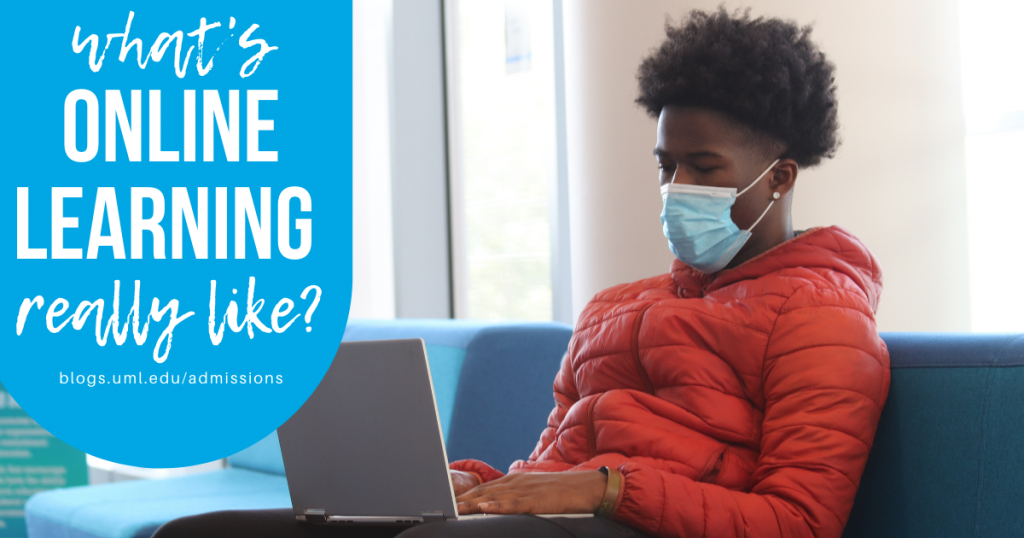
Like many colleges and universities, UMass Lowell converted most instruction this fall to online formats. We know that switching to online learning is a cause of concern for many, but we’ve also been leaders in online education for over 25 years – so we’ve had time to get pretty good at it.
As proof, I talked with Professor Keith Mitchell about how supports his online students.
At UMass Lowell, we offer a variety of virtual and online learning formats. Some remote learning courses are designed to mimic in-person courses and students attend virtual lectures at the same time they would have their traditional courses. Others are more flexible and allow students to complete assignments on a week-by-week basis. Thanks to support services and faculty, like Professor Mitchell, our students are in good hands—no matter if they’re taking online courses because of the pandemic or a personal preference.
Professor Mitchell was recognized with the 2020 Manning Prize for Teaching Excellence, an honor given to one faculty member from each UMass campus for their dedication to teaching and service.
Q: How long have you been at the university, and what are you teaching this semester?
A: I’ve been at the university for 14 years. I got here in 2006. Currently, I am teaching a virtual course—it’s a survey course—American Literary Traditions, which is an introductory course to the English major and English studies.
Q: What are some advantages to learning and teaching online?
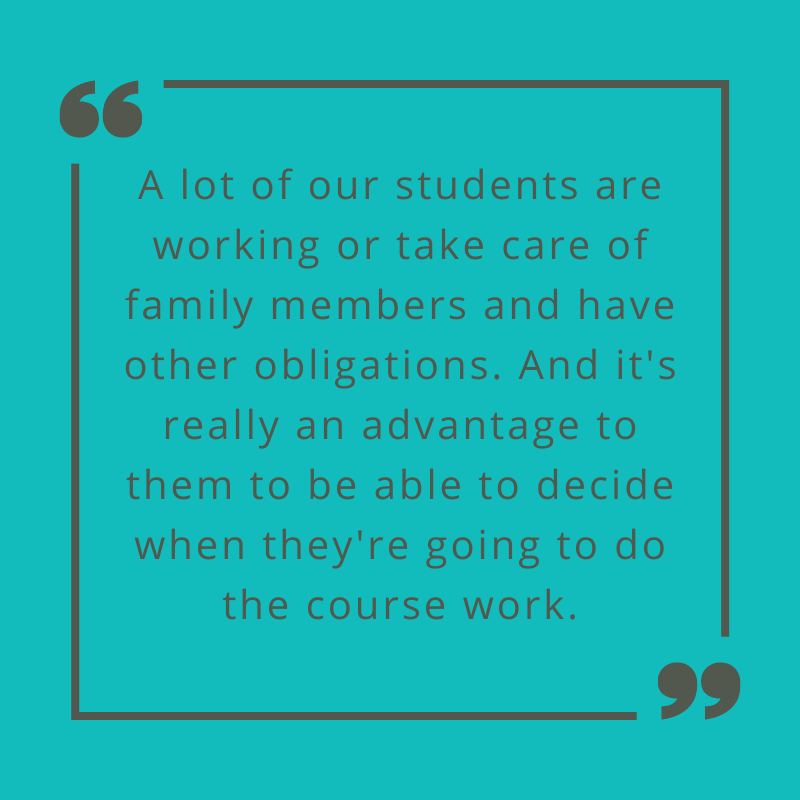
We set up the courses on a week-by-week basis. That’s an advantage to students because they can pace themselves and have a week to do all of the reading, quizzes, discussion board posts and assignments.
It also teaches students to think about their time and to work accordingly. If a student is a night owl, they can work at night. If they’re working during the day, they can do the assignments at night. If they work at night, they can do their assignments during the day.
It works to their advantage because a lot of our students and our online students are working or take care of family members and have other obligations. It’s really an advantage to them to be able to decide when they’re going to do the course work. So long as they finish by the end of the week, then, they’re good.
Q: What is the number one thing students can do to get the most out of an online class and online learning?
A: The most important thing is doing the reading. I construct my classes so that everything—the quizzes, the discussion boards, and the paper topics—is tied back to the reading.
I tell students, if you can get a handle on the reading, there should be no trouble with the other components of the course. Because even though the readings are selective, this is a survey course and it’s over 300+ years of American literature—from the colonial period to our contemporary world, and some of it can be quite difficult.
I think they really appreciate that I don’t give them superfluous assignments that go nowhere. I want to keep everything focused and have all the assignments relate back to the primary readings in the text.
Check this out: Let’s talk about test scores
Q: How do you make sure that online learning engages students and really helps them master the material?
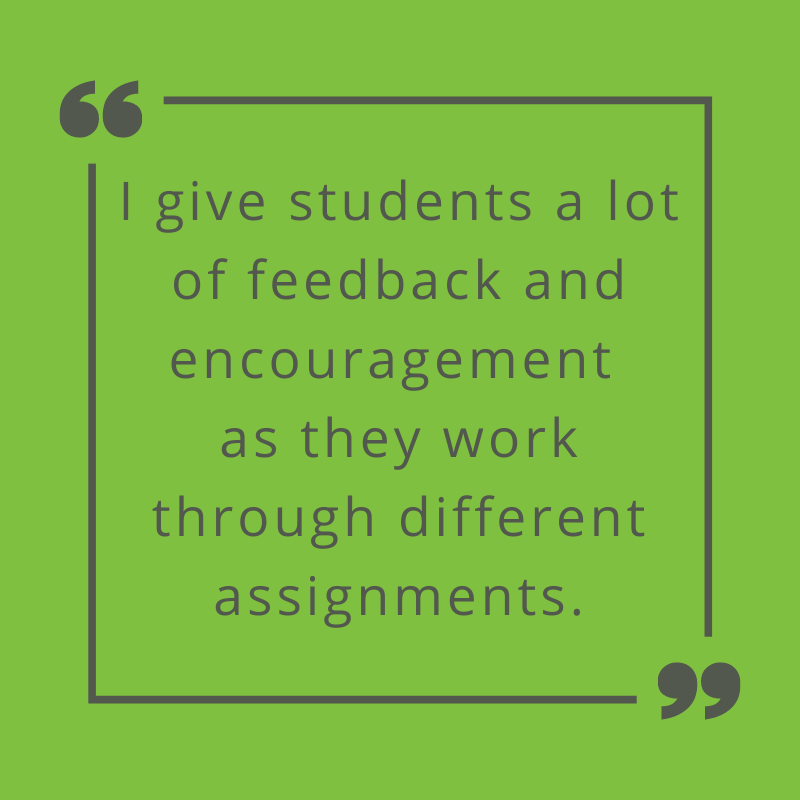
You can see this in the way I set up the discussion board assignments. The questions are very specific because I use these questions to develop their critical thinking and writing skills. In the College of Fine Arts, Humanities and Social Sciences, we use the Modern Language Association style guide. I have students respond using that format. That way, they learn how to use the style guide by writing these shorter discussion board posts in that format, and when they do their longer papers they already know how to use it.
I give students a lot of feedback and encouragement as they work through the different assignments. I make sure that they understand the material. If they still don’t quite understand the material, I will have them come to chat with me in my office hours, where I can go into much more detail and one-on-one help with any specific questions they have.
Q: How do you create a sense of community and keep people connected when it’s an online class?
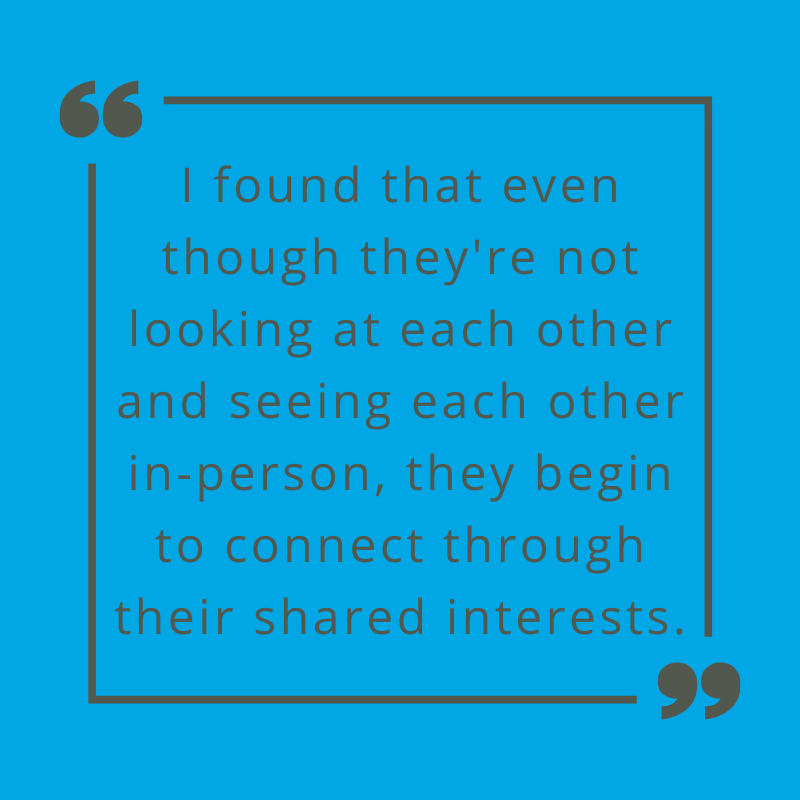
A: I always start with an icebreaker on the first day of the course. I have them tell me in the discussion board a little bit about themselves, why they’re taking the class, what they expect to get out of it and who are their favorite American authors.
That really gets the discussion started between students. I found that even though they’re not looking at each other and seeing each other in-person, they begin to connect through their shared interests.
I notice the community growing when they respond to each other’s posts. I see that there are certain people in the group that gravitate towards each other, and then they also bring in other folks that might need more encouragement to join. They’ll say, “hey, Liz, what do you think about this particular post?” And then that person will respond. It really does create a wonderful community that way.
Q: That’s awesome that they encourage other students in that way. It made me remember how when I was in school, I was kind of always the quiet kid, and I really appreciated those students who encouraged and welcomed me into the conversation. It’s great that there’s still the opportunity for students to do that in online learning.
Yeah, and I think it’s another way for them to support each other—not only getting my support—but for them to support each other.
I also support my students by giving them a lot of feedback. I personally email them when they have written a good paper, post or when they did really well on the quizzes.
I will tell them something like, “Joshua, I really enjoyed what you wrote in your discussion board this week. You pointed out these things—some of which I’ve never thought of before. I just wanted to let you know what a great job you did and keep up the good work.”
I think it’s important to do this because it shows them how much I really appreciate them. I understand that when students take online classes, they have a lot of other obligations, and so for them to want to take classes it means they’re engaged. That means they know what they’re there for and they’re self-selecting. That means that they have made a conscious decision that they’re going to take this class and they’re going to take it seriously and they want to do well.
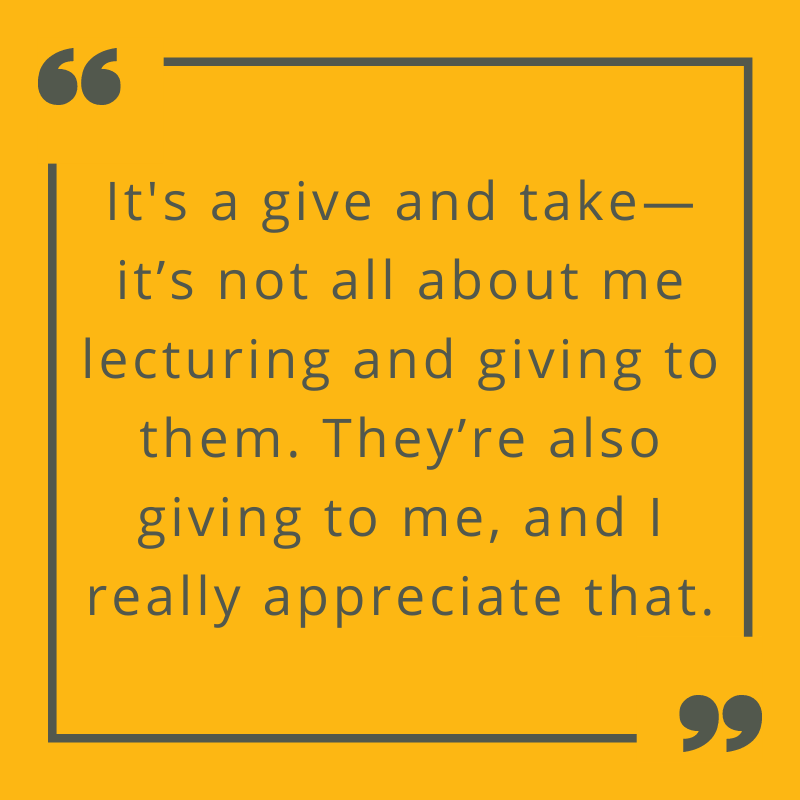
It’s my job is to support them as much as possible and to help them to achieve whatever goals they have. As a matter fact I would say a lot of times they teach me many things—sometimes more things then I teach them.
I taught these texts many times, but a student will see something from a different perspective—especially because in these online classes you have students from all over the world and you also have students from many different disciplines. So, they come at these texts in a different way, and it really illuminates my thinking and often times it changes the way I see and teach the material. It’s a give and take—it’s not all about me just lecturing and giving to them. They’re also giving to me, and I really appreciate that.
The online students are the best—well, I don’t want to dis our face-to-face or virtual students—they’re awesome. But I have enjoyed teaching online for such a long time, and it is a thrill every semester to get to know those students. They’re wonderful.
